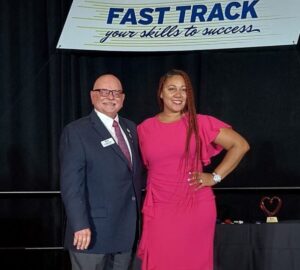By Marianne Lindley Girten
In retrospect, it’s astonishing how briefly, yet how blindingly, the blaze of his personality soared through our orbit.
During only a three- or four-year time period, Rocky Jones was an inescapable gravitational force of fun for so many. He provided much-needed relief and release from the long hours and hard work for court reporting volunteers from many state associations who sacrifice to promote our profession. Few who met him will ever forget him.
An affable man, Rocky’s presence was huge both in physical size and in personality. Adding to his Alaskan-esque image was his beard framing a gold-rimmed tooth in the midst of his ceaseless smile. His size resulted in an ambling walk, like a two-legged Alaskan grizzly bear. But make no mistake, just as people respect and give a wide berth to a grizzly, so too did anyone with a potential criminal intent as I discovered when Rocky escorted me late one night in an area of Washington, D.C., so rough we couldn’t get a cab.
Our paths had crossed only briefly when we both attended Northern Technical School of Business on the Nicollet Mall of Minneapolis during the mid-1970s. We were in different speed classes, but we had mutual friends. In our 20s, it wasn’t unusual for our paths to cross at the nearby Longhorn Bar, or at the Arthur Treacher’s Fish & Chips on what was then an unsavory Hennepin Avenue one block away.
So it was with only a dim memory that, about ten years later, after I’d been in Anchorage for several years, I received a phone call from a tape-recording firm owner in Ketchikan, in Southeast Alaska, who delightedly told me she’d hired a steno reporter named Rocky Jones. “Isn’t that a dreamy name?” I still remember her saying. Because Ketchikan is an island and costly to visit, June hired Rocky over the phone. Much later, I asked Rocky how he’d agreed to move to a place that is known for horizontal rainfall of about 400 inches a year (no, that’s not a typographical error). Rocky replied that it was actually an easy decision after he read fishermen need guns because the halibut are so big that you have to shoot them to get them into the boat.
Anyone who knew Rocky is laughing, because as much as we all loved the man, “dreamy” wasn’t a term often assigned to him. Marshall Jorpeland, then Communications Director of NCRA, relished a photo of Rocky taken by the convention photographer. Mouth agape in a loud guffaw – a typical Rocky stance – Marshall and Rocky both considered it a perfect outtake of what was a then-common higher-education slogan that “A mind is a terrible thing to waste.” The two felt that the photo would be better captioned, “A mind is a terrible thing.” That image and tag line epitomized Rocky’s reputation.
He seemed to take nothing seriously, always seeing the humor in life and in our work. After listening to a reporter complaining about the poor chair they had to use, Rocky nodded sympathetically and told about a deposition setting in the wheelhouse of a boat in the harbor, so small a space that Rocky had to sit with one leg outside on the deck of the boat, with the rumbling engine and screeching seagulls exacerbating the crew member’s foreign accent. But he wasn’t chastising the complainer; no, he always made you feel he truly listened to what you were saying, he truly felt you were important. Rocky was accepting of his own human shortcomings, and he seldom judged others.
One year, NCRA’s Leadership Conference was held during the course of wide media coverage about some whales trapped in the ice up on Alaska’s North Slope. (Drew Barrimore, I believe, later made a movie based on the story.) Everyone wanted Rocky to tell them about the whales. Now, Alaska is the largest state, and Rocky’s town of Ketchikan is as far from the whales’ plight as, say, Atlanta, Ga., is from the Grand Canyon; and Rocky was getting about as upset as Rocky ever got about anything. I still can remember sitting in a meeting and looking up at the sound of an approaching commotion in the hall. It was Rocky, trying to evade even more questions but still surrounded by 20 or 30 other conference attendees, mostly young pretty women, ambling down the hallway. He was a court reporter Alaskan celebrity.
Rocky had a real gift for storytelling, and even a serious story usually had a line of humor running through it. He had reported proceedings in a gruesome murder, but rather than discuss the gory details, his favorite story was about an investigator. In typical Rocky fashion, the story poked fun at Rocky himself, too. Apparently there was testimony about the background, awards and recognition given the investigator. Rocky’s brief for “police officer” was PHR-OFR. Rocky’s finger slipped, with the result that the line came out something like, “So you are a lover (HR-OFR) of some renown and acclaim?” The investigator and Rocky became fast friends.
As did almost everyone else who entered Rocky’s orbit.
Rocky and Lenny DiPaolo, another Anchorage reporter, room-shared during that Leadership Conference. One evening, I knocked at their door, as agreed, to go to dinner. Inside, in one of the smallest hotel rooms I’d ever seen, were almost 20 reporters from all over the country, laughing and talking. They finished off everything alcoholic in the refrigerator. The two stoically paid the bill, and anyone who’s ever gaped at mini-bar charges can understand why, after dinner that night, I watched the two men hoist cases of long-neck bottles on their shoulders and carry them through the lobby of a chic Ritz Carlton back up to their rooms so the next cocktail hour would be less expensive.
As his fan base grew, reporters from different states clamored for more Alaskan stories from him. During the closing festivities, reporters actually physically threw money at him, bills, checks, and coins, to become members of the Ketchikan Court Reporters Association (by this time, Rocky was the sole reporter on the island) in hopes he would distribute a newsletter. Few people know that for almost a year he would periodically call me, agonizing that he had lost all that money. True to his character, he had planned to contribute it to our also-tiny state association. A year later, again at Leadership, the mystery was solved: Someone at the prior conference had given him a necktie case, a gag gift because in small town Alaska nobody wore ties. Rocky had put his one and only tie and the “membership” money into the case, put it aside when he got home, and promptly forgotten he even had a tie case. The next time he opened the necktie case was a year later, when he re-visited civilization.
But Rocky was more complex than it appeared. He rarely showed it in public, but he had no tolerance for complaining, especially about the “plight” of court reporters. The reason became apparent during the first-ever state convention for the Alaska Court Reporters Association.
Karen Ford originated the ASRA concept about 1980, before Rocky moved to the land of horizontal rain, guns, and big fish. Lynda Batchelor (now Barker) revived the idea in the mid-1980s, about the same time as the NCRA leadership taught us how to increase the image of court reporting in Alaska’s audio-recording-dominated legal landscape. Added to our sense of being treated as second class in capturing the record (“Miss Court Reporter, will you play back the tape?”) was our remote location (people Outside live in “the States”). So it was that, seeking camaraderie, we had a huge turnout for our first convention.
The final seminar speaker failed to show so we turned it into a panel discussion, letting us all get to know each other better. Lynda and Rocky were both from Southeast, about 700 miles south of Anchorage. Carol McCue and Jeanine Riley were from either Bethel or Fairbanks, one reachable only by air, the other 350 miles away on the one road to the north. One of the attendees complained how stressful a court reporter’s life is. Then it was Rocky’s turn. He harrumphed, shook some unseen tenseness out of his shoulders, and gave us the story of how he became a reporter:
He had quit NTSB in Minneapolis out of frustration, stuck in his 140s. He’d become a Montana prison guard. One day there was a riot. Rocky and another guard had taken safety in a small room without a window. Time passed. The other guard finally lost it and tore the phone out of the wall, losing contact with the outside. As Rocky put it, the prisoners were shoving burning mattresses against the door to smoke the two men out, all the while letting them know “what they were going to do to us *before* they killed us.” Finally rescue arrived when the prisoners were tear-gassed. Rocky and the other guard were immediately separated, interrogated, and reprimanded even before seeing a doctor.
By this time the convention room was completely still, and Rocky continued that he tried to keep working for almost a year, but that he finally filed workers’ comp over his mental trauma. He went back to court reporting school and started theory all over again. In one year, he completed his 225s. That’s when he gazed around the room, flashed that gold-rimmed tooth at us through his beard, and said: “So I’m here to tell you that there’s no stress in court reporting.” Nevertheless, Rocky could never sit with his back to an open room.
Rocky openly spoke with awe and admiration for “Saint Margaret,” his wife, Maggie. And his eyes gleamed and his voice softened whenever he spoke about his daughter Angie.
Then about the mid-1990s, things fell apart. He occasionally spoke of depression, and we could tell he was struggling. Work referrals suffered. It was impossible to get hold of him. I once left a message at a bar in Ketchikan that he’d sometimes mentioned because he wasn’t answering his work phone. He never announced he was quitting reporting; he just quit reporting. He went through a divorce. He talked of moving to Texas.
I don’t think Rocky appeared at a court reporting function, either in Alaska or elsewhere, since about 1992. Yet more than 20 years later, people still eagerly asked me about him.
It’s funny sometimes how a person suddenly crosses your mind. So it was with Rocky, just last week. I wanted to tell him that Lynda Batchelor Barker’s husband had died, and I called Lenny for the first time in ages, to catch up and to ask if he knew how to contact Rocky. And that’s when I heard that this affable teddy bear of a man, who’d been a rock on more than one occasion for me, whose greatest gift to me had been teaching me that, in all the trials and tribulations of being a court reporter, not to sweat the petty things – that’s when I received the painful news that that gold-rimmed guffaw was stilled almost a year ago.
It’s as if the light of a meteor passing across our heavens has burned out.
Marianne Lindley Girten, RDR, CMRS (Ret.), is a reporter in South Dakota. She can be reached at mygr10@gmail.com.







